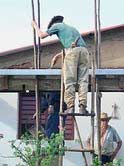‘Everyone and everything is protected’
Cuba excels in hurricane preparedness
Published Sep 4, 2009 8:18 PM
By Gloria Rubac Pinar del Río, Cuba
Like the Gulf Coast of the United States, the island nation of Cuba was hit
hard by hurricanes Gustav and Ike in the fall of 2008.
However, in Cuba, no one, not a single person, was left to their own luck to
survive the hurricanes.
|
A hurricane-damaged
home in Pinar del Río
being rebuilt.
WW photo: Gloria Rubac
|
“We are lucky to have a Revolution! It is a fact that nobody will be
neglected,” wrote Fidel Castro in his “Reflections” on Aug.
28, 2008, before Gustav had yet hit Cuba. “Our strong, forceful and
farsighted Civil Defense protects our people.”
Members of the 2009 Pastors for Peace Cuba Friendshipment Caravan, who traveled
to Cuba from the U.S. this July, found out just how real that statement is.
One group of caravanistas spent four days in the most western Cuban province,
Pinar del Río, which just 10 months earlier had been devastated by Gustav
and Ike. Meeting with government and Communist Party officials in the
provincial capital, we learned firsthand how Cuba prepares for a hurricane and
how they recover from one.
Socialist planning, prevention
|
School in Puerto Esperanza—
From left: Rev. Lucius Walker,
two of the
teachers and caravanista
Bill Hill who was part of the
November 2008
reconstruction
effort.
|
“Our major task is prevention. We protect our population and also the
resources of our economy,” explained an official.
The province of Pinar del Río has a population of 731,000 people. During
Gustav 164,000 people were evacuated and during Ike 192,000 people were
evacuated. Everything was organized, well-planned and well-executed.
Electricity was out for 20 days, but there were generators for businesses and
for people.
“First, we begin before hurricane season is near. We study the
population. We identify which of our people will need help. We know which areas
will flood first. We have food and supplies ready.
“Second, if a hurricane is approaching and evacuation is necessary, we
keep people informed using all media—television, radio and the press. We
begin with those most needy, the elderly, families with small children, the
sick. Students in boarding schools are immediately taken home. Those who have
no one to take them in are taken to civil defense areas that are prepared to
house them.
“Then we evaluate economic problems, such as livestock, crops and
factories, and take precautions.
|
A hurricane-damaged home
being repaired.
|
“When the hurricane hits us, everyone and everything is protected. Once
the hurricane passes, recovery begins immediately.”
In a town in Pinar del Río, Puerto Esperanza, we visited a special school
that had been brutally damaged by the hurricanes. Within weeks, Pastors for
Peace had sent 30 volunteers to help the community rebuild Escuela Especial
Santos Cruz; now it is 90 percent complete. The school educates 76 children
with mild to severe mental retardation.
Before the hurricane hit, all desks, books, school records and other supplies
were stored in a bunker so they wouldn’t be ruined. After the hurricane
students didn’t stop going to school, but met in homes. “Due to
good planning, they didn’t miss a beat,” one of the teachers told
us.
Puerto Esperanza is a village of 2,000 people on the coast. Historically, many
people here have made a living by fishing. Today there is a fishing co-op of
160 workers. After the hurricanes there was a lot of destruction, but today
they have rebuilt and recovered from the storms.
The director of the co-op, Magaly Rodríguez Gómez, told us that no
one lost their job after Gustav and Ike hit last year. Everyone was paid while
the rebuilding was going on.
She explained that since the Cuban revolution there has been a 180-degree turn
in the fishing industry.
“Before, the private fishermen wouldn’t pay regular salaries. After
the season ended, the workers would lose their jobs. Now, we are paid
year-round. After our boats were damaged from the hurricanes, we were still
paid while we rebuilt our industry, and it is now 100 percent
complete.”
On July 31, 130 caravan members joined with 140 members of the Venceremos
Brigade in central Havana for an Anti-imperialist Tribune. One of the speakers
was Irma González, daughter of political prisoner René González,
one of the Cuban Five being imprisoned in the U.S.
González told the international audience of mostly North Americans:
“We welcome you as our brothers and sisters. We take pride that we are
never by ourselves. You visit our country in difficult times. You struggle
against the blockade and you support our heroes, the Cuban Five.”
She continued, “The last few years of hurricanes have been difficult.
Over a half a million homes were destroyed. We had over $10 billion in damage.
But nobody was forsaken in our country. We made huge efforts and no one lost
their job. The most important thing ever is the life of every single human
being in Cuba.”
Articles copyright 1995-2012 Workers World.
Verbatim copying and distribution of this entire article is permitted in any medium without royalty provided this notice is preserved.
Workers World, 55 W. 17 St., NY, NY 10011
Email:
[email protected]
Subscribe
[email protected]
Support independent news
DONATE


